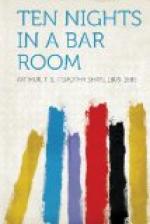I remained at the village a portion of the day, but saw nothing of the parties in whom the incidents of the previous evening had awakened a lively interest. At four o’clock I left in the stage, and did not visit Cedarville again for a year.
NIGHT THE SECOND.
The changes of A year.
A cordial grasp of the hand and a few words of hearty welcome greeted me as I alighted from the stage at the “Sickle and Sheaf,” on my next visit to Cedarville. At the first glance, I saw no change in the countenance, manner, or general bearing of Simon Slade, the landlord. With him, the year seemed to have passed like a pleasant summer day. His face was round, and full, and rosy, and his eyes sparkled with that good humor which flows from intense self-satisfaction. Everything about him seemed to say—“All ’right with myself and the world.”
I had scarcely expected this. From what I saw during my last brief sojourn at the “Sickle and Sheaf,” the inference was natural, that elements had been called into activity, which must produce changes adverse to those pleasant states of mind that threw an almost perpetual sunshine over the landlord’s countenance. How many hundreds of times had I thought of Tom Morgan and Willy Hammond— of Frank, and the temptations to which a bar-room exposed him. The heart of Slade must, indeed, be as hard as one of his old mill-stones, if he could remain an unmoved witness of the corruption and degradation of these.
“My fears have outrun the actual progress of things,” said I to myself, with a sense of relief, as I mused alone in the still neatly arranged sitting-room, after the landlord, who sat and chatted for a few minutes, had left me. “There is, I am willing to believe, a basis of good in this man’s character, which has led him to remove, as far as possible, the more palpable evils that ever attach themselves to a house of public entertainment. He had but entered on the business last year. There was much to be learned, pondered, and corrected. Experience, I doubt not, has led to many important changes in the manner of conducting the establishment, and especially in what pertains to the bar.”
As I thought thus, my eyes glanced through the half-open door, and rested on the face of Simon Slade. He was standing behind his bar —evidently alone in the room—with his head bent in a musing attitude. At first I was in some doubt as to the identity of the singularly changed countenance. Two deep perpendicular seams lay sharply defined on his forehead—the arch of his eyebrows was gone, and from each corner of his compressed lips, lines were seen reaching half-way to the chin. Blending with a slightly troubled expression, was a strongly marked selfishness, evidently brooding over the consummation of its purpose. For some moments I sat gazing on his face, half doubting at times if it were really that of Simon Slade. Suddenly a gleam flashed over it—an ejaculation was uttered, and one clenched hand brought down, with a sharp stroke, into the open palm of the other. The landlord’s mind had reached a conclusion, and was resolved upon action. There were no warm rays in the gleam of light that irradiated his countenance— at least none for my heart, which felt under them an almost icy coldness.




